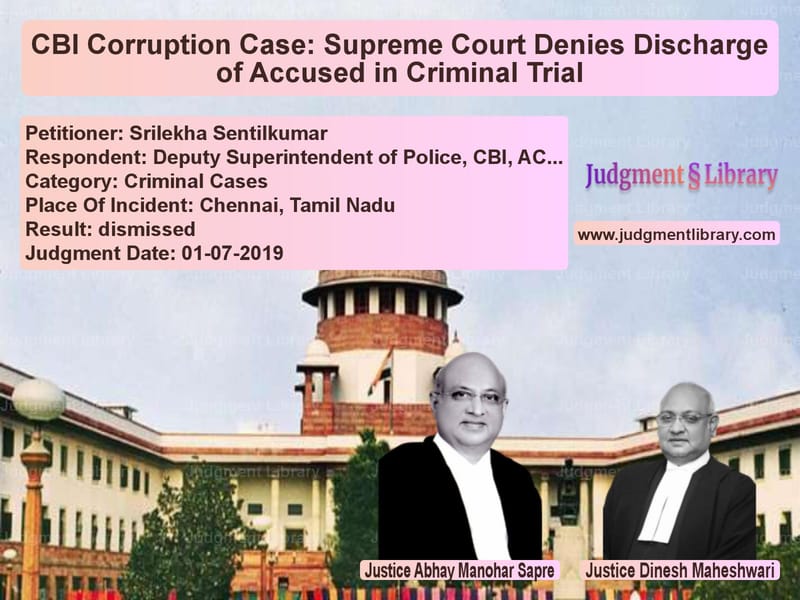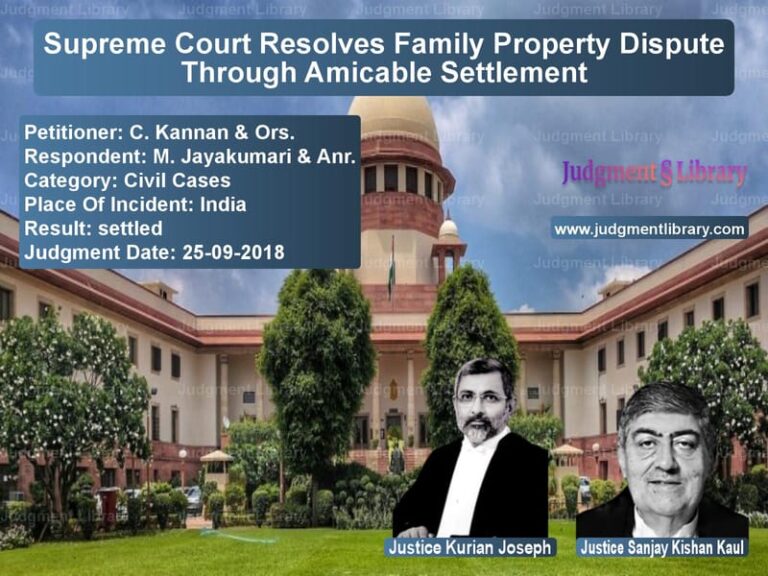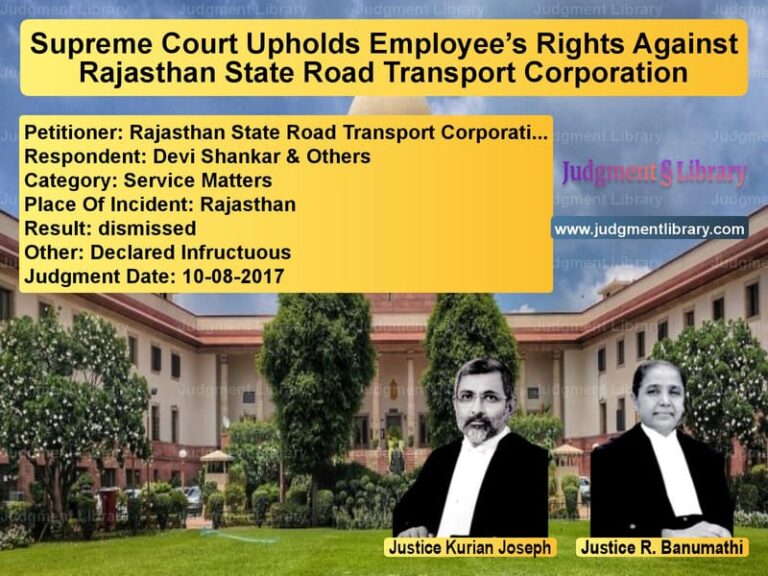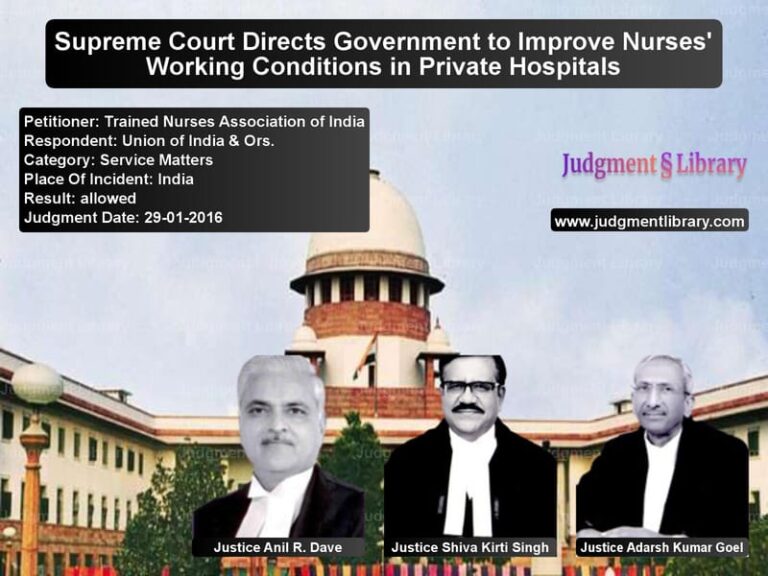CBI Corruption Case: Supreme Court Denies Discharge of Accused in Criminal Trial
The case of Srilekha Sentilkumar vs. Deputy Superintendent of Police, CBI, ACB, Chennai is a landmark ruling concerning corruption and criminal conspiracy under the Prevention of Corruption Act, 1988. The Supreme Court dismissed the appellant’s request for discharge from the case, affirming that the allegations against her must be tested through trial.
The case revolves around the involvement of Srilekha Sentilkumar, an accused in a corruption scandal investigated by the Central Bureau of Investigation (CBI). She was charged under various sections of the Indian Penal Code (IPC) and the Prevention of Corruption Act for allegedly being part of a criminal conspiracy to commit corrupt practices. The trial court and the Madras High Court had rejected her plea for discharge, leading her to appeal before the Supreme Court.
Background of the Case
The appellant, Srilekha Sentilkumar, was named as Accused No. 3 in C.C. No. 15 of 2014 before the Special CBI Court, Chennai. She was facing trial for offenses under:
- Section 120B of the Indian Penal Code (criminal conspiracy).
- Sections 7, 12, and 13 of the Prevention of Corruption Act, 1988.
The case was part of a larger investigation by the CBI into corruption and financial irregularities involving multiple accused.
The sequence of legal proceedings is as follows:
- In 2014, CBI filed a charge sheet against Srilekha Sentilkumar and six other accused.
- She filed an application under Section 239 of the Code of Criminal Procedure (CrPC) seeking discharge from the case.
- The trial court rejected her discharge plea on February 5, 2018.
- She challenged the trial court’s order before the Madras High Court, which also dismissed her plea on May 4, 2018.
- She then appealed to the Supreme Court, seeking relief from prosecution.
Petitioner’s Arguments
The appellant, through her legal counsel, raised the following key arguments:
- The charges against her were baseless, and there was no direct evidence linking her to the alleged corruption.
- The CBI’s investigation was flawed and did not establish her involvement in any conspiracy.
- The evidence presented by the prosecution was insufficient to warrant a trial against her.
- The trial court and the High Court failed to appreciate that the case lacked merit and should have allowed her discharge.
Respondent’s Arguments
The CBI, representing the prosecution, countered with the following points:
- There was prima facie evidence against the appellant, which required a full trial.
- The case involved multiple accused in a corruption scandal, and her role needed to be examined in detail.
- The discharge plea was premature as it sought to quash the case before evidence could be fully evaluated.
- The allegations under the Prevention of Corruption Act were serious and warranted a complete judicial examination.
Supreme Court’s Observations
The Supreme Court bench, comprising Abhay Manohar Sapre and Dinesh Maheshwari, analyzed the validity of the High Court’s findings and made the following observations:
- The issues raised by the appellant involved questions of fact that could only be determined through trial.
- The trial court and the High Court were correct in dismissing her discharge plea.
- The appellant would have the opportunity to present her defense during the trial and should not seek pre-trial discharge.
- The prosecution had presented sufficient evidence to justify proceeding with the trial.
Critical Judgment Excerpt: “The issues urged by the appellant and the same having been refuted by the respondent are such that they can be decided more appropriately and properly during trial after evidence is adduced by the parties rather than at the time of deciding the application made under Section 239 of the Cr.P.C.”
Final Decision
The Supreme Court dismissed the appeal and upheld the trial court’s decision to proceed with the prosecution. The key rulings were:
- The appellant’s request for discharge was premature and unfounded.
- The allegations against her were serious enough to warrant a full trial.
- The trial court must decide the case strictly based on the evidence presented.
- The observations made in the lower court orders should not prejudice the trial.
Implications of the Judgment
This ruling has significant implications for corruption cases and criminal trials:
- Accused persons must face trial if the prosecution presents prima facie evidence.
- Discharge applications cannot be used to bypass due process in corruption cases.
- The judiciary must ensure that criminal trials are conducted fairly and on the merits of the case.
- The burden of proving innocence lies on the accused during the trial, not at the stage of discharge.
The Supreme Court’s decision in Srilekha Sentilkumar vs. CBI reinforces the principle that allegations of corruption must be thoroughly examined through trial. The ruling ensures that individuals accused of financial misconduct cannot escape prosecution through premature discharge applications.
Petitioner Name: Srilekha Sentilkumar.Respondent Name: Deputy Superintendent of Police, CBI, ACB, Chennai.Judgment By: Justice Abhay Manohar Sapre, Justice Dinesh Maheshwari.Place Of Incident: Chennai, Tamil Nadu.Judgment Date: 01-07-2019.
Don’t miss out on the full details! Download the complete judgment in PDF format below and gain valuable insights instantly!
Download Judgment: Srilekha Sentilkumar vs Deputy Superintenden Supreme Court of India Judgment Dated 01-07-2019.pdf
Direct Downlaod Judgment: Direct downlaod this Judgment
See all petitions in Fraud and Forgery
See all petitions in Judgment by Abhay Manohar Sapre
See all petitions in Judgment by Dinesh Maheshwari
See all petitions in dismissed
See all petitions in supreme court of India judgments July 2019
See all petitions in 2019 judgments
See all posts in Criminal Cases Category
See all allowed petitions in Criminal Cases Category
See all Dismissed petitions in Criminal Cases Category
See all partially allowed petitions in Criminal Cases Category







